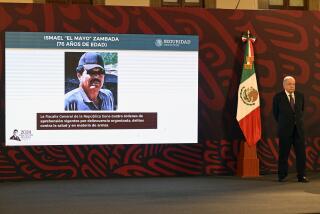Stalking U.S. Executives Abroad : Kidnaping in Philippines Suggests That Terrorists Are Shifting Focus to Business People Overseas
- Share via
The screech of tires, the masked men with machine guns, the blindfold and the burning rubber as the abductors disappear.
It is perhaps an international business person’s worst nightmare: being kidnaped or assassinated simply for being American.
On Friday in the Philippines, that nightmare came true for Michael Barnes, a 41-year-old Long Beach man working for Philippine Geothermal Inc., a Unocal Corp. subsidiary in Manila.
Three men with submachine guns stopped Barnes’ Mercedes-Benz in front of his office in Manila’s business district about 6:50 a.m., shoved him into a Jeep driven by a fourth man and sped away, the State Department said.
Newspapers in Manila reported that the company received a $20-million ransom demand in a letter bearing the seal of the communist New People’s Army. The U.S. Embassy early Saturday said it could not confirm the existence of the letter or that the NPA was involved in the kidnaping. Unocal officials declined to comment.
Barnes’ disappearance underscores the fact that, despite changes in the world’s political order, multinational corporations and their executives have become the leading targets for attacks by terrorists, according to the security consulting firms Kroll Associates and Business Risks International.
“The U.S. remains a principal target (for terrorists), and corporations are a growing target,” said Brian Jenkins, a terrorism expert and senior managing director at Kroll. “They are symbols of the U.S. and are seen by terrorists as lucrative targets, both politically and financially.”
The reason: Traditional terror targets, such as embassies, airliners and airports, have beefed up security and become less vulnerable. Terrorists are simply moving down the food chain, eyeing relatively accessible businesses and their executives as the new hostages of choice.
Changes in geopolitics have not eased the situation for business people, though terrorism in some areas, notably the Middle East, has abated since the peak years of the mid-1980s, analysts said.
Attacks directed against U.S. businesses or executives rose to 65 in 1990 from 59 in 1989, the State Department reported. Most were bombings. The number of terrorist incidents against all U.S. nationals abroad went up to 197 from 166. Meanwhile, the number of all terrorist incidents worldwide fell to 456 from 533, the department reported.
Much of the increase against all Americans abroad was attributable to the Persian Gulf crisis. Still, a business person is “more likely to be the target than you were 10 years ago,” said Charles Vance, a former Secret Service agent and president of Vance International, a security consulting firm in Oakton, Va.
In March, 1991, alone, terrorist groups set off bombs at Citibank branches in Athens and in Istanbul and Izmir, Turkey, and at a Bank of Boston branch in Santiago, Chile. One group entered the offices of the oil service firm Brown & Root in Istanbul, moved most of the employees to another room and shot and killed the American manager, Jenkins said.
Security consultants agree that the most perilous places to do business include Turkey, Greece, Sri Lanka, Myanmar, Colombia, Peru and other Latin American nations.
Threats can come from extreme political groups and ethnic separatists, from drug traffickers and even from militant wings of anti-abortion, environmental or animal rights groups.
Terror statistics don’t take into account common crimes directed against foreign nationals, such as the murder in Manila on Jan. 7 of an American employee of the Asian Development Bank, who was beaten and stabbed to death.
In Colombia, narco-terrorists compete with political guerrillas in kidnaping executives and targeting businesses. By one account, the National Liberation Army has blown up the main oil pipeline about 60 times in the last year.
Occidental Petroleum Co., which has major oil holdings in that troubled country, has instituted elaborate security precautions against such bombings, including employing an army of counter-surveillance experts, a source said. Occidental officials would not comment on its security.
In the Philippines, where the State Department this month restated its travel advisory warning of potential danger to Americans, the New People’s Army is believed responsible for the deaths of two employees of Ford Aerospace, a Defense Department contractor, in September, 1989, and of an American geologist, his wife and father-in-law in February, 1990, Jenkins said.
Barnes is the third U.S. national to be kidnaped in recent years, the State Department said. In October, 1990, the NPA abducted Arvey Drown, who is still being held.
Barnes has lived in the Philippines since 1986. As vice president of the local American Chamber of Commerce, he has been prominent in the business community. But that says little about the motives for his kidnaping.
“There was all kinds of talk about alleged ransom demands, but we have to be very careful,” said one U.S. official in Manila. “You don’t know what it is. You don’t know what you can discount. It could be the left or the right doing it for money. It could be neither.”
Operators of corporate security consulting firms say they have been receiving more calls lately from companies concerned about protecting expatriate executives. Even so, officials remain vulnerable.
Vance recalls hearing of one executive who traveled to Manila under an assumed name but arrived at his hotel room to find a note of warning waiting for him from the NPA--addressed to his real name. “It said this was going to be the last time he was in this country, or else,” he said. “They shipped him right out of there.”
Times staff writer Bob Drogin contributed to this report from Manila.
More to Read
Sign up for Essential California
The most important California stories and recommendations in your inbox every morning.
You may occasionally receive promotional content from the Los Angeles Times.













